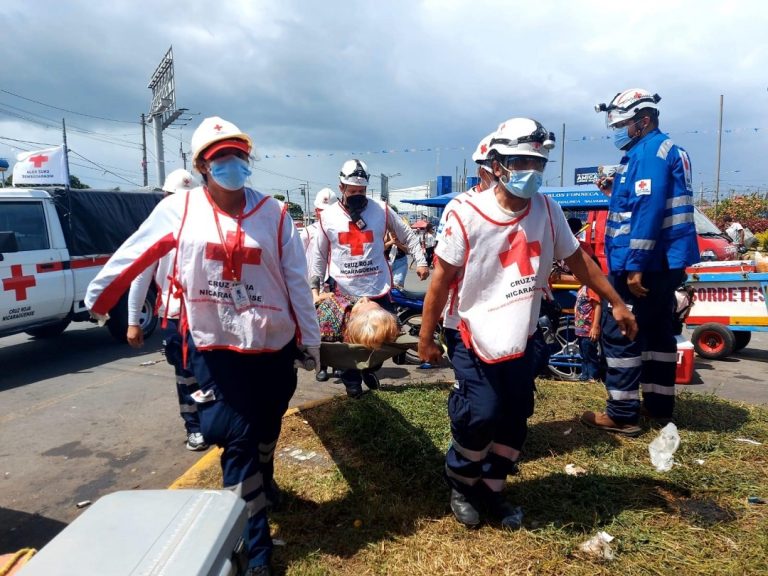12 de mayo 2023

Children of Exile: The Births “Sowing Hope” in the Camp of Nicaraguan Farmers

PUBLICIDAD 1M
PUBLICIDAD 4D
PUBLICIDAD 5D
It’s not just the closure of yet another NGO, but an end to humanitarian protections from a neutral Red Cross.

Red Cross lifeguards rescue a citizen in a procession in Managua. Photo: Facebook Red Cross
The dictatorship headed by Daniel Ortega and Rosario Murillo in Nicaragua has decided to shutter the Nicaraguan Red Cross Association, affiliate of the International Red Cross. The dictatorship’s new provision creates a Nicaraguan Red Cross instead, a decentralized entity to be under the Ministry of Health. Supposedly, this body will continue to comply with the international legal framework of the 1949 Geneva Agreements and their Additional Protocols. In other words, the regime is establishing its own Red Cross.
For the average Nicaraguan, the Red Cross is an institution that transports the wounded and sick to receive medical attention; the place where you get your eyes checked for your driver’s license; a place where you can donate blood or request it if you need to; and the agency that provides lifeguards at the country’s most popular beaches during vacation periods. However, the truth is that the Red Cross emerged 160 years ago to protect the sick and wounded in armed conflicts, later giving rise to what is now known as International Humanitarian Law.
A Red Cross integrated into the structures of government is completely incompatible with the neutrality that characterizes and is the most recognized feature of the Red Cross internationally, as well as the principles of impartiality and independence the institution embodies. To offer a practical example: if an armed conflict or civil war were to arise in Nicaragua at this moment (the Ortega army against dissident armed forces; or the Armed Forces against an irregular army), the regime’s Red Cross can’t offer neutral humanitarian assistance, because it already forms part of one of the bands.
Perhaps the example seems exaggerated, but it’s worth remembering that the report from the International Group of Independent Experts that was set up by the Inter-American Commission for Human Rights in 2018, as well as the report released in March of this year by the UN Group of Human Rights Experts on Nicaragua, documented cases where Nicaragua’s Ministry of Health denied medical attention to those wounded by the regime’s repressive forces during [the social uprising] of 2018. Instead, the Ministry adhered to government policies that targeted the demonstrators, policies that led to allegations of Crimes against Humanity.
The regime’s absorption of the Red Cross into its structures supposes that in the event of a new repressive wave, the services of the distinguished institution could be hindered, as occurred with the Fire Station on Managua’s north highway, during the fateful 2018 blaze in the city’s Carlos Marx neighborhood.
Crimes against Humanity have been committed and are still being committed in Nicaragua. In addition, all spaces for political participation linked to a demand for the reestablishment of democracy in the country have been closed off. The regime has rewarded loyalty within the Army with sizable economic perks. The sum of these actions creates a breeding ground for the emergence of belligerent groups that aspire to overturn the regime through armed struggle, or at least a new social explosion.
In the volatile Nicaraguan context, the regime’s decision to eliminate the Red Cross can’t just be viewed as the closure of yet another NGO, but as an act that leaves a country deprived of humanitarian protection and at the mercy of a dictatorship that has committed Crimes against Humanity and is willing to continue committing them to remain in power. The closure of the Red Cross in Nicaragua is a warning bell for the international community in terms of the human cost implied by the persistence of a police state in Nicaragua or its worsening.
* The author holds a Master’s in Human Rights.
This article was originally published in Spanish in Confidencial and translated by Havana Times
PUBLICIDAD 3M
Abogado nicaragüense, máster y consultor independiente en Derechos Humanos, radicado en México.
PUBLICIDAD 3D